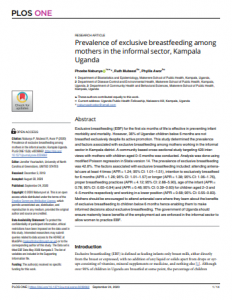
Exclusive breastfeeding (EBF) for the first six months of life is effective in preventing infant morbidity and mortality. However, 36% of Ugandan children below 6 months are not breastfed exclusively despite its active promotion. This study determined the prevalence and factors associated with exclusive breastfeeding among mothers working in the informal sector in Kampala district.
A community based cross-sectional study targeting 428 interviews with mothers with children aged 0–5 months was conducted. Analysis was done using modified Poisson regression in Stata version 14. The prevalence of exclusive breastfeeding was 42.8%. The factors associated with exclusive breastfeeding included: attending antenatal care at least 4 times (APR = 1.24; 95% CI: 1.01–1.51), intention to exclusively breastfeed for 6 months (APR = 1.26; 95% CI: 1.01–1.57) or longer (APR = 1.38; 95% CI: 1.06–1.76), proper breastfeeding practices (APR = 4.12; 95% CI: 2.88–5.90), age of the infant (APR = 0.78; 95% CI: 0.65–0.94) and (APR = 0.48; 95% CI: 0.39–0.60) for children aged 2–3 and 4–5 months respectively and working in a lower position (APR = 0.68; 95% CI: 0.55–0.83).
Mothers should be encouraged to attend antenatal care where they learn about the benefits of exclusive breastfeeding to children below 6 months hence enabling them to make informed decisions about exclusive breastfeeding. The government of Uganda should ensure maternity leave benefits of the employment act are enforced in the informal sector to allow women to practice EBF.